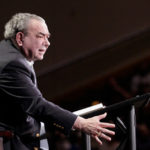 -TurretinFan
-TurretinFan
(original source here)
Dr. Michael Brown and Dr. Sam Waldron had a very cordial debate on the question, “Have the New Testament Charismatic Gifts Ceased?” Dr. Brown’s rebuttal arguments did not appear to me to reflect an understanding of Dr. Waldron’s primary argument, the so-called Cascade Argument.
I strongly believe that it is important to a dialog that both sides understand the other. Thus, my hope is that by spelling out this argument in writing, I can clarify the argument to Dr. Brown, to those who agree with him, and more broadly to those considering the question of the gifts.
The Cascade Argument can be summarized thus:
1) There are no apostles of Christ on earth today.
2) Because there are no apostles of Christ, there are no prophets.
3) Because there are no prophets, there are no tonguespeakers.
4) In view of 1-3, there are no miracle workers on earth today.
1. There are No Apostles of Christ on Earth Today
A) To be an Apostle of Christ was itself a gift to the church, and the foremost of the gifts. 1 Corinthians 12:28-31 Ephesians 4:8-11 – Christ gave gifts to men, among them apostles.
B) The term “apostles of Christ” is to be distinguished from missionaries, aka “apostles of the churches,” which is a different office. Only “apostles of Christ” are no longer among us.
C) To be an apostle of Christ, there were three distinguishing marks:
i) Directly appointed by Christ (Mark 3, Luke 6, Acts 1:2, Acts 10:41, Galatians 1:1). That’s why the lot was used.
ii) Physical eyewitnesses of the Resurrected Jesus (Acts 1:22, Acts 10:39, 1 Corinthians 9:1)
iii) They are able to confirm their apostlate by doing miracles (2 Corinthians 12:12).
D) The apostles of Christ spoke authoritatively for Jesus Christ (1 Corinthians 14:37).
E) There are five reasons we know from Scripture that the Apostlate ceased:
i) Ephesians 2:20 The church is built on the foundation of the apostles and prophets, which alludes to Revelation 21:14. The analogy implies that the apostles and prophets were confined to the foundational period of church history.
ii) 1 Corinthians 15:8 Paul “last of all” was the last one to see the risen Christ. And since being a physical eyewitness to the risen Christ is one of the marks of an apostle, Paul is the last apostle.
iii) 1 Corinthians 12:31 and 14:1 indicate that Christians cannot seek the gift of Apostle of Christ – the greatest gift they could seek was prophecy, even though apostleship was identified as a gift.
iv) Galatians 2:7-9 Paul received the right hand of fellowship from the 12 apostles, but no one can today.
v) Ephesians 2:20 This passage describes the form of the New Testament as “apostles and prophets.” If there were apostles and prophets today, the canon would be open, as those apostles/prophets continued to speak authoritatively. But Charismatics (nearly all) recognize that the canon is closed, therefore they ought to recognize that the apostlate is also closed.
F. Apostolic Gift is Linked to Impartation of Other Gifts (Acts 8)
This suggests the cessation of the miraculous gifts.
2. There are No Prophets Today
A) The cessation of the apostolate creates the presumption or at least possibility of cessation of other gifts.
B) NT Prophets like the Apostles were foundational to the New Testament church. (Ephesians 2:20)
C) Definition of Prophet in Deuteronomy 13 & 18 was never rescinded, and this requires infallibility.
D) Just as the OT’s authority is summarized as “the prophetic word” (2 Peter 1:19-21) and its form is also described in about a dozen NT references to “the law and the prophets” or “Moses and the prophets”, so also the NT’s canon is summarized in Ephesians 2:20 as “apostles and prophets” (the prophets in question are NT prophets as seen in Ephesians 3:5; 4:11 and 1 Corinthians 12:28).
3. There are No Tongue-Speakers Today because Tongues was a form of prophecy.
A) Acts 2 tongue speaking is explained by reference to Joel 2, where it is described as prophecy.
B) 1 Corinthians 14:5 asserts the equivalence of the two gifts, if tongues is interpreted.
C) In both tongues and prophecy, the speaker is uttering mysteries, which refers to prophetic revelation (1 Corinthians 13:2, Revelation 1:3, 1:20, and 10:7).
4. There are No Miracle-Workers Today
There may be miracles today, but there is a difference between miracles and miracle workers.
The Cascade Argument was augmented by a dilemma as to the first point: if they accept the point, then they are at least cessationists in some form, since the first and greatest gift no longer exists; whereas if charismatics want to assert that there are living apostles of Christ today, then they are denying a clear New Testament teaching. Additionally, if such apostles exist today, then they have the same authority/infallibility that the original apostles had.

 Article: R. C. Sproul: God is Satisfied (original source
Article: R. C. Sproul: God is Satisfied (original source  Article: R. C. Sproul: Are Those Who Have Never Heard of Christ Going to Hell? (original source
Article: R. C. Sproul: Are Those Who Have Never Heard of Christ Going to Hell? (original source